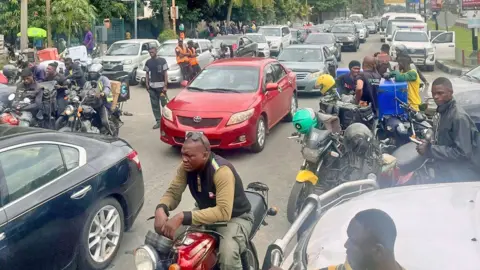Gridlock in Nigeria amid fuel shortages and price hikes
 BBC
BBCNigerians have been hit by a double whammy of chronic fuel shortages and a hike in prices by the state-owned oil company.
The Nigerian National Petroleum Corporation (NNPC), which imports the country’s fuel and distributes it to private sellers, blamed its debts and rising global prices for its difficulty in getting fuel.
Many people have been left stranded with long queues at petrol stations nationwide. Commuters in Lagos have been lining up at bus stations, but there very few buses operating.
Others told the BBC they have been forced to trek long distances as public transport prices have doubled along some routes.
On Tuesday, the NNPC said it was putting up the petrol price from 617 naira ($0.40, £0.30) to 897 naira a litre.
- Why Nigeria's economy is in such a mess
- Why Nigerians are praying for the success of a new oil refinery
- People turn to 'throw-away' rice for food
Its petrol stations have the cheapest fuel on sale in the country - but at the vast majority of other private garages the pump price is much higher.
When the NNPC puts up the price, so do private sellers and in some states, like Oyo, Kano and Kaduna, petrol is now selling for as much as 1,200 naira a litre.
Many garages around the country have shut because they have run out of fuel, others have closed to adjust their prices.
In the capital, Abuja, most are open but all have long queues as desperate drivers wait their turn - some slept in their cars overnight.
Fuel stations are not rationing supply, so there is a danger their wait will be futile.
A motorcycle rider in Kano, the main trading hub of northern Nigeria, said it was frustrating: “Most of the fuel stations here in Kano are closed because they want to adjust their pumps to the new price.
“I was able to get fuel at 950 naira at a particular station, but other places have already started selling at 1,200 per litre,” Aminu Danyaro told the BBC.
Black-market traders, who buy fuel from petrol stations and sell it by the roadside from jerrycans at inflated prices, are doing a brisk trade in Kano, where there is significantly less traffic than usual.
The Nigeria Labour Congress (NLC) - the country’s main trade union body - says it feels “betrayed”, explaining that the reason it accepted the new minimum monthly wage of 70,000 naira ($44, £34) in July was because there was an agreement with the government that petrol price would not be increased.
When President Bola Tinubu came to power last year, he shocked Nigerians on his first day by removing a subsidy that kept the price of fuel low.
This - amongst other policies - has led to the worst economic crisis in a generation and cost-of-living protests, dubbed “10 days of rage”, were held countrywide last month.
Nigerians are now pinning their hopes on the new privately owned Dangote Petroleum Refinery, which has been built by one of Africa’s richest man, Aliko Dangote.
On Monday, it was announced with great fanfare that the refinery had just started producing petrol - a milestone in Nigeria which despite being Africa’s largest producer of crude oil imports all its refined fuel.
But it is not clear how long Nigerians will have to wait to see ready availability of petrol or a drop in prices.
You may also be interested in
 Getty Images/BBC
Getty Images/BBCGo to BBCAfrica.com for more news from the African continent.
Follow us on Twitter @BBCAfrica, on Facebook at BBC Africa or on Instagram at bbcafrica
